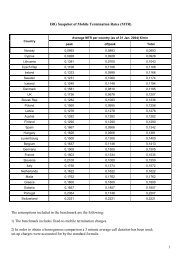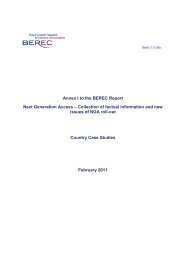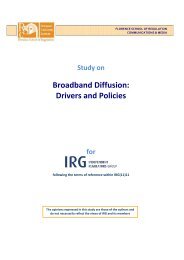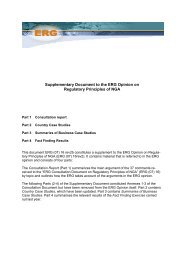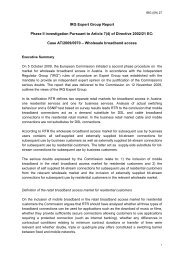You also want an ePaper? Increase the reach of your titles
YUMPU automatically turns print PDFs into web optimized ePapers that Google loves.
<strong>IRG</strong>-WG RA (<str<strong>on</strong>g>07</str<strong>on</strong>g>) <strong>WACC</strong> Master Doc<br />
PIB 11:<br />
<strong>IRG</strong> is of the opini<strong>on</strong> that every proposed methodology to calculate a divisi<strong>on</strong>al <strong>WACC</strong><br />
has its pro and c<strong>on</strong>s. Therefore, the best approach for NRAs is to compare the results<br />
obtained using the different methodologies prior to selecting a final value.<br />
5.3 Divisi<strong>on</strong>al <strong>WACC</strong> in practice<br />
5.3.1 The UK experience<br />
Traditi<strong>on</strong>ally Ofcom (previously Oftel), assessed the cost of capital at company level.<br />
However in a c<strong>on</strong>sultati<strong>on</strong> that started <strong>on</strong> January 20<str<strong>on</strong>g>05</str<strong>on</strong>g> Ofcom proposed, for the first time, to<br />
disaggregate its estimate of BT’s (fixed incumbent operator) equity beta in order to reflect the<br />
different levels of systematic risk faced by different parts of BT’s business.<br />
Stakeholder resp<strong>on</strong>ses to this proposal were divided. On <strong>on</strong>e side, BT and the cable<br />
companies were opposed to estimating the risk of BT’s copper access business <strong>on</strong> a<br />
standal<strong>on</strong>e basis. The str<strong>on</strong>gest argument cited by stakeholders against estimating an equity<br />
beta for BT’s copper access business was that, in the absence of pure play comparators, a<br />
beta for BT’s copper access business could not be estimated with any reliability. On the other<br />
side, competitors and customers of the incumbents were, broadly speaking, in favour of<br />
assessing risk at a disaggregated level and therefore estimating a distinct equity beta for<br />
BT’s copper access business.<br />
Ofcom, after having examined and discussed all the resp<strong>on</strong>ses to the public c<strong>on</strong>sultati<strong>on</strong>,<br />
remained of the view that it is appropriate to apply a disaggregated approach to beta<br />
estimati<strong>on</strong> in relati<strong>on</strong> to BT’s copper access business.<br />
Ofcom assembled a wide range of evidence in support of its proposals, including:<br />
• Benchmarking the equity betas of the UK’s largest utility companies, and drawing a<br />
parallel between the level of risk faced by these companies with that faced by BT’s<br />
copper access business;<br />
• Benchmarking the equity betas of US telecoms companies;<br />
• Using previously c<strong>on</strong>ducted studies to compare estimates of the income elasticity of<br />
demand for retail access services (e.g. line rental) with that of other telecoms services<br />
(calls).<br />
• An analysis of the regulatory precedents for the use of a disaggregated approach to<br />
quantifying risk at a project-specific level;<br />
• Two types of quantitative regressi<strong>on</strong> analysis, namely:<br />
- A cross-secti<strong>on</strong>al analysis of telecoms companies across the world, examining the<br />
relati<strong>on</strong>ship between companies’ equity beta estimates and the proporti<strong>on</strong> of their<br />
business that is accounted for by different types of activities, e.g. “informati<strong>on</strong> and<br />
communicati<strong>on</strong>s technology” (ICT), and traditi<strong>on</strong>al fixed lines activities;<br />
- A time series analysis of BT’s equity beta, examining the relati<strong>on</strong>ship over time<br />
between its equity beta and the proporti<strong>on</strong> of its business accounted for by<br />
different types of activity.<br />
30



